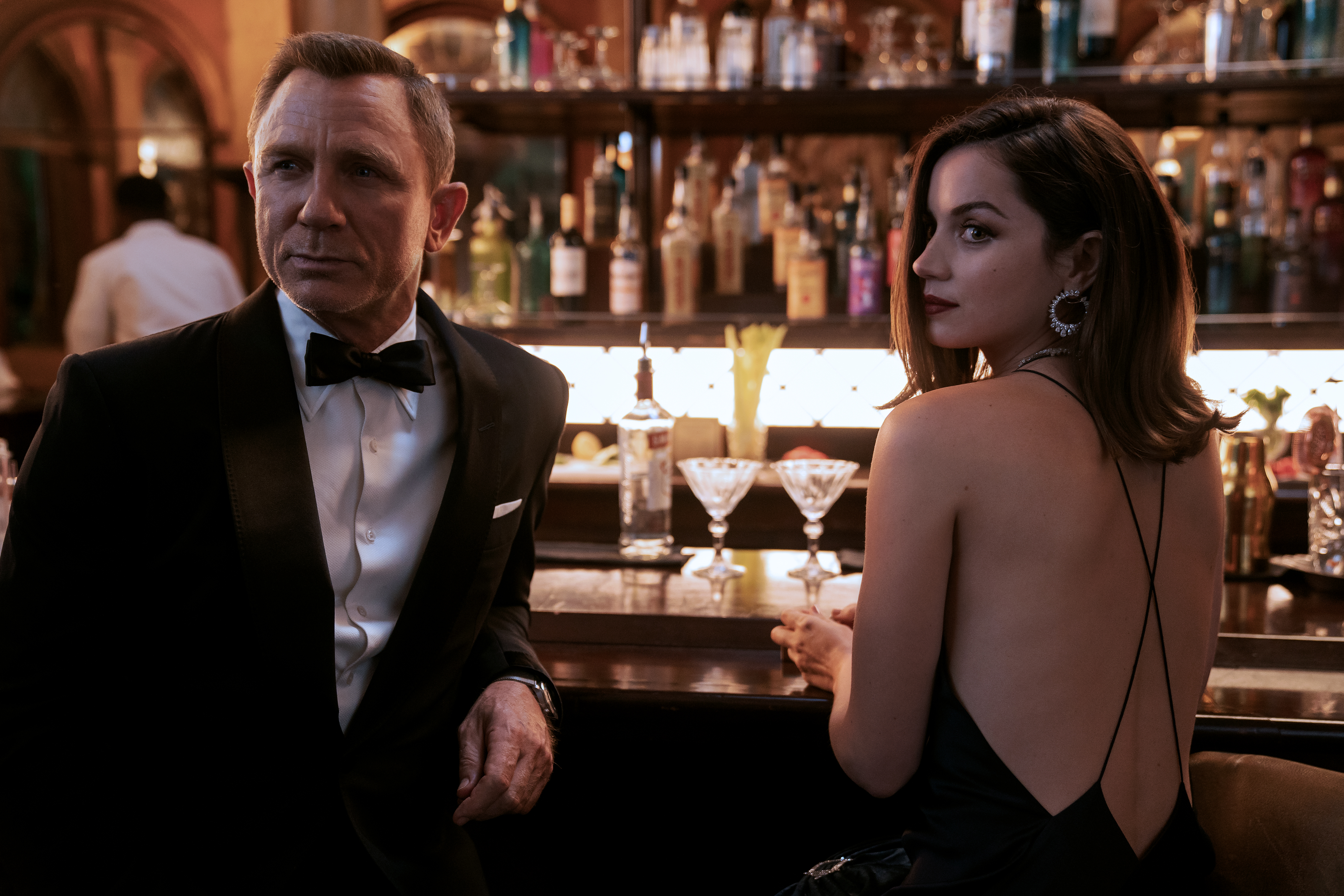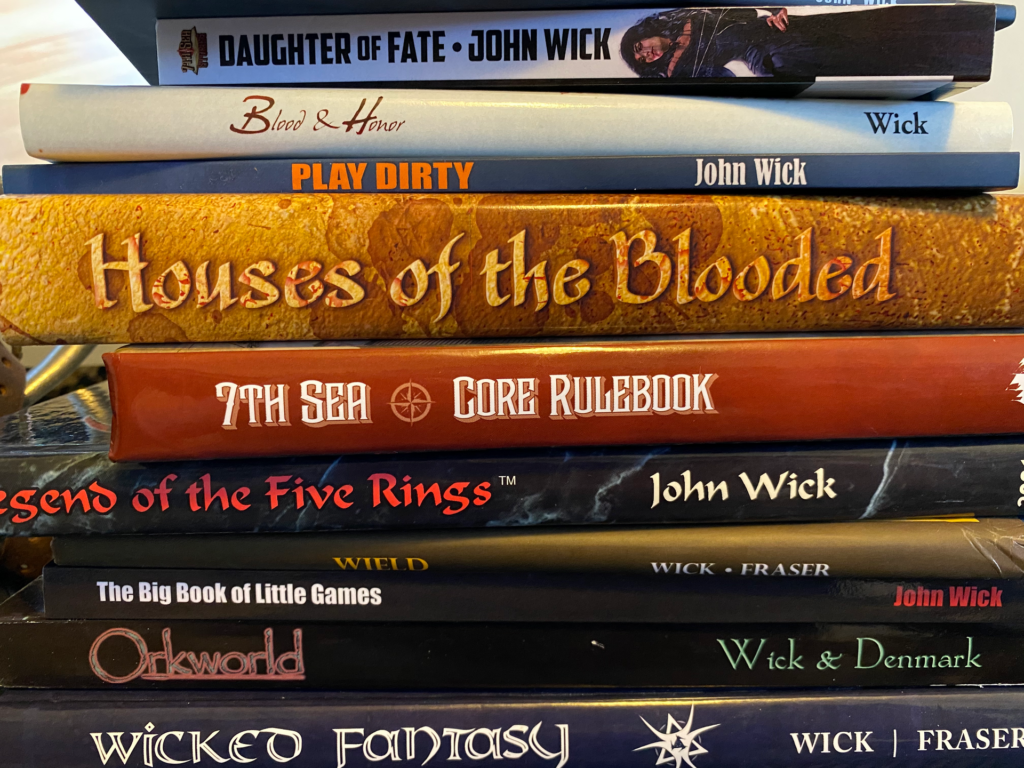
This year, at North America’s biggest gaming convention, I had the unique opportunity to grab a couple members of Chaosium (the makers of Call of Cthulhu, Runequest, and Pendragon, as well as 7th Sea) and walk around the dealer’s room, showing them the booths where little games were on display. I told them, “This is where real innovation happens.” That’s because small game companies have nothing to lose. They aren’t like Hasbro with Dungeons & Dragons who make an announcement like “Not all orks are evil,” and have to suddenly duck behind blast shields because the fan base may explode after having heard such a “dangerous idea” and ride out a shit storm of fan outrage—real or imagined—because the ideas in D&D have been around so long, making even a single innovation to the game, bringing it up to 21st century standards, could be considered “dangerous.”
And if you’re wondering what this has to do with James Bond, just remember when the Bond fans almost had spontaneous brain aneurisms because Daniel Craig was—wait for it—blonde. Forget that, in the canonical books, the world’s most famous secret agent was English and they cast a man from Scotland in Dr No, and if you don’t see a problem with that, you’ve clearly never visited Scotland. (And yes, Bond’s creator, Ian Flemming, later changed Bond’s back story to change 007’s heritage but that was because he was so impressed with Sean Connery’s portrayal of Bond, but make no mistake, when this whole franchise started, Bond was English and since then has been played by an Irishman and a Welshman, and again, if you don’t see a problem with that, well… you shouldn’t because it’s a stupid distinction. Almost as stupid as saying James Bond can’t be played by Indris Elba because… ah, you know what, I’m not going to take this any further, but I hope you get my point.)
Anyway, as characters grow older—and I’m talking in real chronological years—they should become more elastic. Writers have been reinterpreting “mythic” characters like Bond for thousands of years, but there’s always the hold outs who insist on keeping the character “pure” to the source. And these are the hold outs who prevent characters from evolving, literally speaking to past generations rather than the present or future ones. One of the amazing things that Marvel has been doing is taking classic characters like Iron Man, Thor, and the Guardians of the Galaxy, dusting them off, and giving them new voices. Look at the newest Spider-Man movies. That is not 1960’s Peter Parker. It isn’t even 1970’s, ‘80’s, or ‘00s (see what I did there?) Spider-Man. That’s a Spider-Man for the 2020’s, speaking to a younger generation of fans with their language. Actually addressing that Queens is not full of beautiful, blonde, white teenagers, but a hodgepodge of cultures and peoples that actually better represent the old cliché of the American melting pot. This is a Spider-Man for today, not yesterday, and that’s just one of the reasons why the movies feel like so much fun. Yes, he’s still in love with the seemingly unreachable Mary Jane, still has a single Aunt May, still has to balance high school with being a super hero, but does all the classic Spider-Man things in completely new ways.
And that’s because characters should be elastic. As writers, we have a responsibility to take classic characters and update them to a new audience. The myth has to be reshaped for new generations. If you don’t, then you get what happens to myth when it doesn’t adapt and change: it turns in to religion, full of dogma, sacred cows and untouchable traditions.
And with all that in mind, let’s talk about the new James Bond flick, No Time to Die.
Before saying anything else, I should say this: Daniel Craig is my favorite James Bond. Yes, that means I like him more than Connery. Frankly, re-watching the old Bond films, the misogynistic swagger is just too much for me, and that isn’t a new thing. I didn’t like it all that much back when I was a kid watching the movies on VHS tapes when my dad used to record them on network television when they played on the Friday Night Movie on CBS. Yes, I’m that old. I’m not some punk kid screaming “POLITICAL CORRECTNESS!!!” at the screen. And I grew up not only watching Bond on TV and on the movie screen, but reading his adventures, too. I’m a huge fan. But as fans we should also be aware of the faults of 007’s portrayals in the past. And frankly, while some of those faults make Bond interesting, there are others that make him a serious problem.
Bond is a chain-smoking, alcoholic, misogynistic, jingoistic (some may say fascistic) killing machine. (Something Alan Moore uses to brilliant effect when he makes Bond a villain in his League of Extraordinary Gentlemen comics. I mean, seriously. Can you think of a more dangerous villain than Sean Connery’s Bond?)
But that also means we get scenes like the one in Goldfinger—universally recognized as the classic Bond episode and possibly the best Bond movie for over 40 years—where he literally rapes a lesbian into enjoying sex with a “real man.” Yeah. That’s Pussy Galore. Go back and watch it with that in mind and tell me how much fun that Judo-in-the-barn scene is now that you’ve got that in your mind.
Again, Daniel Craig is my favorite Bond and Skyfall is my favorite Bond film. I love the directing, the acting, the action, but what I like most is how it takes big risks with the character and his world. Yes, it’s still got the worn-out cliché of a Bond villain, and yes, it blatantly steals the plot and characters from The Dark Knight right down to the “We’re not so different you and I” cliché that—
—you know what? I need to make this clear. Please. Please. Please. Hollywood. Stop using this. We’ve seen it so many times, it’s no longer cliché. It’s passe. We expect it. We yawn when we see it. You’ve used it enough. Just… please, just stop. Stop. Please.
Okay, back to Skyfall. The director (and writers) were allowed to do things nobody had ever done before in a Bond film. We saw characters who we never expected to change or die actually change or die. And there’s a line that made our audience laugh out loud so hard, we missed following dialogue.
And why did that line work so well? Because it makes sense for Bond to say it, even if he never said it before. It’s a new addition to Bond’s character that expands the possibilities of who Bond is while, at the same time, fitting his character perfectly.
(If you want to see the scene for the first time or remember it, I’ve included a link below.)
Yes, Skyfall does some new, fun things, but it is also loaded with clichés that just need to die. We’ve seen them. We’ve seen them so many times, they actually work as ballast, bringing the film down rather than lifting it up.
No Time to Die feels a lot like Skyfall. It takes a bunch of risks with Bond and his universe, but at the same time, is so desperate to play it safe, clinging to tired canards. Yes, there’s a new 007 (because in the previous film, Bond retired) who is played by a wonderful black actress named Lashana Lynch, but she really never gets an opportunity to shine. There’s great banter and chemistry between her and Craig, but again, she feels like a toy the owners of the franchise are too afraid to take out of the box. I want to see more of her, but more on that later.
Then, there’s the return of Léa Seydoux as Madeleine, and she gives Bond a fantastic foil. She’s not your typical Bond Girl (or Bond Woman, or whatever you prefer). She’s dangerous, she’s good at keeping secrets, she is, in many ways, everything that Vesper Lynd could have been if the producers didn’t kill her off at the end of Casino Royale. Of course Bond falls in love with her, and of course there’s a dark secret in her past that will show up to threaten that love. And this time, there’s a twist that’s new, that gives Bond an angle on his character that makes you think, “How is this going to change him?” And, in fact, it does change him, even if it’s just for the last fifteen minutes of the film.
And speaking of fifteen minutes, there’s an incredible cameo from Ana de Armis that proves she can hold her own in Bond’s world. She shows up just long enough to make you fall in love, then you never see her again. And yes, that’s another Bond cliché, but at least she doesn’t end up in a refrigerator. I got to spend enough time with her to want to see her again as a replacement for Felix Leiter. More on that later.
The plot is so redundant, there’s no point in explaining it. The film never does, so I don’t see a reason why I should. Thanos blah blah half the population blah blah. Look, this is actually the least interesting part of the movie, which makes the villain the least interesting part of the movie, and that’s a damn shame because Rami Malek’s character could have been a great Bond villain if only he had a motivation that hasn’t been done to death already.
As for the action, I loved every time Hans Zimmer’s score revved up. The director, Cary Joji Fukunaga, has serious chops. This is no surprise. And there’s another cliché—the one-shot hallway fight—that Fukunaga has a great take on. My mind went, “Oh, here’s the one-shot hallway fight,” but ten seconds in, I was in. I just wish he had more meat to work with.
Finally, there’s the ending. And yeah, I was a little surprised. I’m not going to say anything more, but I’m now seriously curious what the next chapter in the Bond franchise will be.
But I have a suggestion. (Yes, this is where the “more on that later” is leading.)
I want to see a double-oh Netflix series. I want to see 001, 002, and all the rest of them in season long stories that are actually real political espionage thrillers. And I want to see Ana de Armis and Lashana Lynch as a reoccurring characters. What’s more, I want the other double-oh’s complaining about Bond. He’s a screw up. He never returns equipment. He sleeps with everything. He fails more than he succeeds. He’s got to kick in the door with a gun in both hands (and both feet, sometimes), killing everything in sight when he could just slip a radioactive pellet in the target’s tea.
That’s what I want to see next for the Bond franchise.
I liked No Time to Die. I think it brought a lot of new things to Bond, but on the other hand, still relied on tired tropes from not only its own world, but from other franchises as well. I had fun saying goodbye to my favorite Bond, but I’m hoping the next one will give me enough reasons to make him my favorite.
Or maybe even her.
